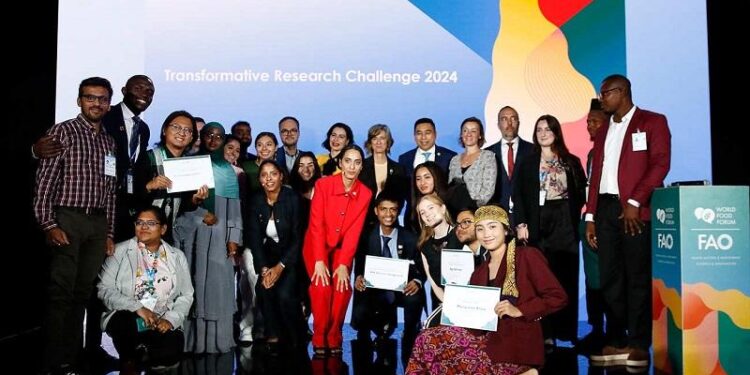Chengdu, China – The 2025 World Food Forum has officially launched its inaugural week in Chengdu, setting the stage for a groundbreaking dialogue on global agricultural innovation. Organized by the Food and Agriculture Organization (FAO), this event brings together leaders from various sectors, including government, industry, and civil society, to address pressing challenges in food security and sustainability. As nations grapple with the ongoing impacts of climate change, population growth, and resource depletion, the forum aims to foster collaborative solutions that could reshape the future of food systems worldwide. With a focus on innovation and partnership, the Chengdu Launching Week is poised to inspire transformative strategies that ensure equitable access to nutritious food for all, laying the groundwork for a resilient agricultural landscape in 2025 and beyond.
Chengdu Launches Global Agricultural Innovation Initiative During World Food Forum
Chengdu has officially unveiled its ambition to become a hub for global agricultural innovation during the much-anticipated World Food Forum. The initiative aims to foster collaboration among nations, research institutions, and the private sector, facilitating knowledge exchange and the implementation of cutting-edge agricultural techniques. Attendees from around the world engaged in discussions surrounding the adoption of sustainable practices and modern technology, emphasizing innovation as a key pillar for future food security. Key themes such as agricultural technology, sustainable practices, and food distribution were prominent, highlighting the urgent need to adapt to the growing challenges posed by climate change and population growth.
A variety of projects and partnerships have already been proposed under this initiative, spotlighting Chengdu’s vast resources and strategic importance in the global agricultural landscape. Among the highlights are partnerships focusing on precision farming, urban agriculture, and biotechnology. These initiatives are expected to significantly enhance productivity and reduce environmental impact. To assess ongoing progress, a series of workshops, panel discussions, and networking events will be held throughout the week. The aim is not only to share successes but also to tackle barriers that impede innovation in agriculture across different regions.
| Project Name | Description | Expected Outcome |
|---|---|---|
| Precision Farming Initiative | Integration of AI technologies with farming. | Increase in yield efficiency. |
| Urban Agriculture Network | Creation of community gardens in cities. | Improved access to fresh produce. |
| Biotechnology for Sustainability | Research on genetically modified crops. | Reduction of pesticide use. |
Experts Highlight Sustainable Practices to Transform Food Systems
During the inaugural week of the 2025 World Food Forum in Chengdu, experts have come together to emphasize the urgent need for transformative sustainable practices within global food systems. Highlighting innovative measures, speakers underscored how these strategies can significantly reduce environmental impacts while enhancing food security. Key areas of focus included:
- Regenerative Agriculture: Promoting farming techniques that restore and enhance soil health.
- Circular Economy: Encouraging waste reduction through food recycling and repurposing.
- Agroecology: Utilizing biodiversity to create resilient agricultural systems that sustain livelihoods.
- Technological Innovations: Leveraging precision agriculture and digital tools for more sustainable farming practices.
Experts also recognized the importance of collaborative partnerships between governments, private sectors, and local communities in advancing these initiatives. Discussions stressed that through cooperative efforts, the integration of traditional practices with modern technology can yield both economic benefits and environmental stewardship. A collaborative platform was proposed, outlined in the table below, to facilitate knowledge sharing and best practices among stakeholders:
| Stakeholder | Role | Key Contribution |
|---|---|---|
| Governments | Policy Makers | Establishing supportive regulations |
| Private Sector | Investors and Innovators | Providing funding for sustainable projects |
| Local Communities | Practitioners | Implementing day-to-day sustainable practices |
Policy Recommendations Emerged from Forum Discussions for Future Resilience in Agriculture
The recent forum discussions unveiled a series of transformative policy recommendations aimed at enhancing resilience in agriculture amidst ongoing global challenges. Key stakeholders emphasized the need for integrated approaches that address both climate resilience and food security. Among the highlighted strategies were:
- Promotion of Sustainable Agricultural Practices: Advocating for eco-friendly techniques such as agroecology and precision farming to minimize environmental impact.
- Investment in Research and Development: Encouraging funding for innovative agricultural technologies and practices, prioritizing local solutions that meet the unique needs of diverse communities.
- Strengthening Supply Chains: Creating more robust, adaptive supply chains that can withstand disruptions while ensuring food access in vulnerable regions.
Additionally, participants called for enhanced public-private partnerships to mobilize resources and know-how effectively. It was noted that collaboration across sectors could yield significant advancements, particularly in areas like digital agriculture and data-sharing networks. The following table summarizes the proposed initiatives and their potential impacts:
| Initiative | Potential Impact |
|---|---|
| Sustainable Practices | Reduced carbon footprint and improved soil health |
| R&D Investment | Fostering innovation tailored to local farming challenges |
| Supply Chain Resilience | Enhanced food security and stability in prices |
Final Thoughts
As the world’s agricultural leaders converge in Chengdu for the 2025 World Food Forum Launching Week, the air is charged with anticipation and resolve. This initiative, under the auspices of the Food and Agriculture Organization, signals not only a commitment to addressing current food security challenges but also a proactive stance towards fostering sustainable innovations in agriculture. By harnessing global collaboration and leveraging cutting-edge technologies, the forum aims to reshape food systems that can withstand the pressures of climate change and growing populations. As discussions unfold and ideas take root, the outcomes of this week will be pivotal, setting the stage for transformative practices that can feed future generations. Stakeholders are united in their quest to turn aspirations into action, reminding us that the path to a sustainable agricultural future is a shared responsibility-one that begins today in Chengdu.














Did a Restorer Secretly Paint Italian Prime Minister Giorgia Meloni Into a Historic Church Fresco?